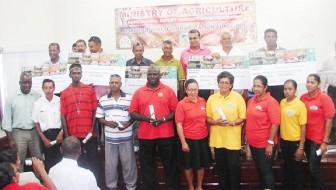Local livestock, fruit and vegetable producers yesterday received the first disbursements from a $340M Agricultural Diversification Fund that has been launched to boost non-traditional agriculture exports.
The first loans under the 10-year Agriculture Export Diversification Programme (AED), being supported by the Inter-American Development Bank (IDB), were disbursed at a launch ceremony at the Guyana Bank for Trade and Industry (GBTI) recreational facility at Bel Air.

Initial disbursements were made to large scale farmers Beni Sankar, of Sankar’s Tilapia Farm Inc, who received $21.2M; Bannsingh Guyadeen, who received $9.5M for his aquaculture farm; Bagwan Dhaniram, a fruit and vegetable farmer, who received $2.9M; Premnauth Bisnauth, a fruit and vegetable farmer who received $2.4M; and Roopnarine Matadial, who received $12.3M.
In addition, grants from the Small Farmers Fund were awarded to the Pomeroon Women’s Association, which received $1.1M to be used to produce and market virgin coconut oil; the West Berbice Sheep and Goat Association, which received $1M to rear the livestock on a large-scale basis; the Region 10 Farmers Association, which received $1.1M; the Parika/Naamryck/Ruby Farmers Producers Association, which received $1.1M; and the Rockstone Village Council, which received $1.2M to support vegetable and fruit production.
Agriculture Minister Robert Persaud, who gave the feature address, also informed that another $350M, to complete similar agricultural projects, was given by the International Fund for Agricultural Development and its benefits would soon be seen.
GBTI was selected by the Ministry of Agriculture to facilitate the AED programme and its Chief Executive Officer John Tracey told the launch that the bank is proud to be the financial executor of the programme, since it is the biggest lender to the agricultural sector this year and overall in the last ten years.
He added that although the programme is not oriented towards traditional agricultural, GBTI felt it would be significant, particularly due to growing food demands globally. “While fairly modest in amount, we feel this programme is equally significant to the development of the agricultural sector, allowing specific non-traditional activities to be given a financial injection geared towards boosting agricultural exports,” he said.
Tracey, in an overview, explained that the US$1.7 million would be distributed to applicants countrywide for the duration of the ten year project. The Ministry of Agriculture is responsible for technical aspect of the project, including pre-identifying and pre-approving applicants, while the bank would check, approve and ensure repayments of loans as well as keep the funds revolving.
Since the programme operates as a revolving fund, as fast as loans are repaid over the life of the initiative, other applicants would be considered. Approved producers will be given lower interest rates, ranging between 5% and 8% depending on loans, which will be between $3M and a maximum of $9M. The lower rates were given in part due to concessions granted by government to GBTI.
Tracey was confident about the repayment and revolving system, while noting that with a similar rice project the bank saw 96% of the loans repaid.
He added that with this project, it is confident of an increase in the repayment percentage. He urged recipients to have up to date bookkeeping systems in place and readily available, since the bank will be making periodic checks as a means to measure the progress of the projects.
So far, GBTI has received 44 applications from the three agriculture clusters: 24 for investment in the fruits and vegetables sector; 11 for livestock; and nine for aquaculture.
Beni Sankar, of Sankar’s Tilapia Farm Inc, who received the largest loan, at $21,241,000, was elated to be among the first to be approved. He said that the business has one of the surest markets if one were to look at the growing population and food demands. He added that he was grateful for the loan and would make best of it as he strives to develop the aquaculture sector in Guyana.
Persaud specifically highlighted the aquaculture investment, which he said was his. He said the growth of the sector in the short timeframe since it was developed is a major achievement, since it not only provided jobs but is also seen as the largest food growth industry in the next ten years.
Persaud also defended the government’s decision not to revive the Guyana Agricultural Development Bank (GAIBANK), stating that its accounting systems, among other internal issues, would have been not only too taxing but also too time consuming. He stated that using independent banking institutions such as GBTI was beneficial to both the Guyanese people and the government and that similar and current projects bear testimony of the benefits.
“Farmers and people within the agricultural sector, in the absence of a dedicated financial institution for agriculture, can still have that window and we have seen it work and we have seen it work successfully,” he said.




